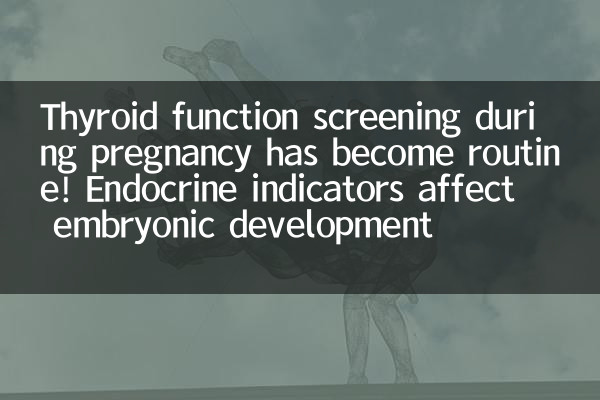Thyroid function screening during pregnancy has become routine! Endocrine indicators affect embryonic development
In recent years, with the deepening of medical research, thyroid function screening during pregnancy has gradually become a routine item for prenatal examinations. Latest data show that abnormal thyroid function may have a significant impact on embryonic development and even lead to adverse pregnancy outcomes. This article will analyze the importance of thyroid function screening during pregnancy and provide structured data support based on the hot topics of the entire network for the past 10 days.
1. The effect of abnormal thyroid function on pregnancy

Thyroid hormones play a key role in embryonic development, especially the nervous system development of fetals in early pregnancy. According to recent studies, abnormal thyroid function can lead to the following risks:
| Types of thyroid abnormalities | Effects on pregnancy | Incidence rate (%) |
|---|---|---|
| Hypothyroidism (hypothyroidism) | Abortion, premature birth, fetal intellectual stunting | 2-5 |
| Hyperthyroidism (hyperthyroidism) | Pregnancy hypertension and fetal growth restriction | 0.1-0.4 |
| Thyroid antibody positive | Increased risk of miscarriage and postpartum thyroiditis | 5-15 |
2. Comparison of domestic and foreign screening guidelines
There are differences in recommendations for screening of thyroid function in pregnancy in major medical organizations around the world, but in recent years, there have been widespread tendency to support routine screening:
| Institution/Country | Screening recommendations | Screening time |
|---|---|---|
| American Thyroid Association (ATA) | Screening for high-risk populations | 8 weeks before pregnancy |
| Guidelines for diagnosis and treatment of thyroid diseases during pregnancy in China | Recommended screening for all pregnant women | Early pregnancy |
| European Thyroid Association | Recommend universal screening if conditions permit | 12 weeks before pregnancy |
3. Interpretation of screening indicators
The screening of thyroid function during pregnancy mainly includes the following indicators, and the reference range is different from that of the general population:
| Test indicators | Reference range in early pregnancy | Reference range for mid-pregnancy | Clinical significance |
|---|---|---|---|
| TSH (thyroid stimulating hormone) | 0.1-2.5 mIU/L | 0.2-3.0 mIU/L | Main screening indicators |
| FT4 (free thyroxine) | 12-22 pmol/L | 11-19 pmol/L | Assess the status of thyroid function |
| TPOAb (thyroid peroxidase antibody) | <34 IU/mL | <34 IU/mL | Predict the risk of abnormal thyroid function |
4. Hot topic discussion: Screening disputes and consensus
Recent discussions on screening of thyroid function during pregnancy have focused on the following aspects:
1.Universal Screening vs High Risk Screening: Experts supporting universal screening believe that about 30% of pregnant women with abnormal thyroid function have no typical symptoms; opponents point out that it may cause excessive medical treatment.
2.Treatment threshold: There is still controversy over whether subclinical hypothyroidism (elevated TSH but normal FT4) needs treatment. The latest research supports that TSH >4.0 mIU/L should be intervened.
3.Screening cost-effective: Recent research published by Chinese scholars shows that for every 1 adverse pregnancy outcome avoided in general screening, 200-300 people need to be screened, with a good cost-effectiveness ratio.
5. Expert advice and public awareness
According to medical expert interviews and popular science articles in the past 10 days, suggestions for women who prepare for pregnancy and pregnancy include:
1.Pregnancy screening: Especially for those with a family history of thyroid disease, previous miscarriage or autoimmune diseases, screening is recommended for 3 months of pregnancy.
2.Re-examination during early pregnancy: The thyroid demand increases after pregnancy, and TSH needs to be checked as soon as possible after the diagnosis of pregnancy.
3.Standardized treatment: After abnormal diagnosis, treatment should be done under the joint guidance of the endocrinology department and obstetrics department to avoid adjusting the dosage by yourself.
4.Postpartum follow-up: About 5-10% of pregnant women may develop postpartum thyroiditis, and thyroid function needs to be checked 6 weeks after delivery.
With the accumulation of medical evidence, screening of thyroid function during pregnancy has become an important measure to protect the health of mother and child. It is recommended that expectant mothers pay attention to this examination, communicate fully with the doctor, and jointly protect the healthy development of the embryo.

check the details

check the details